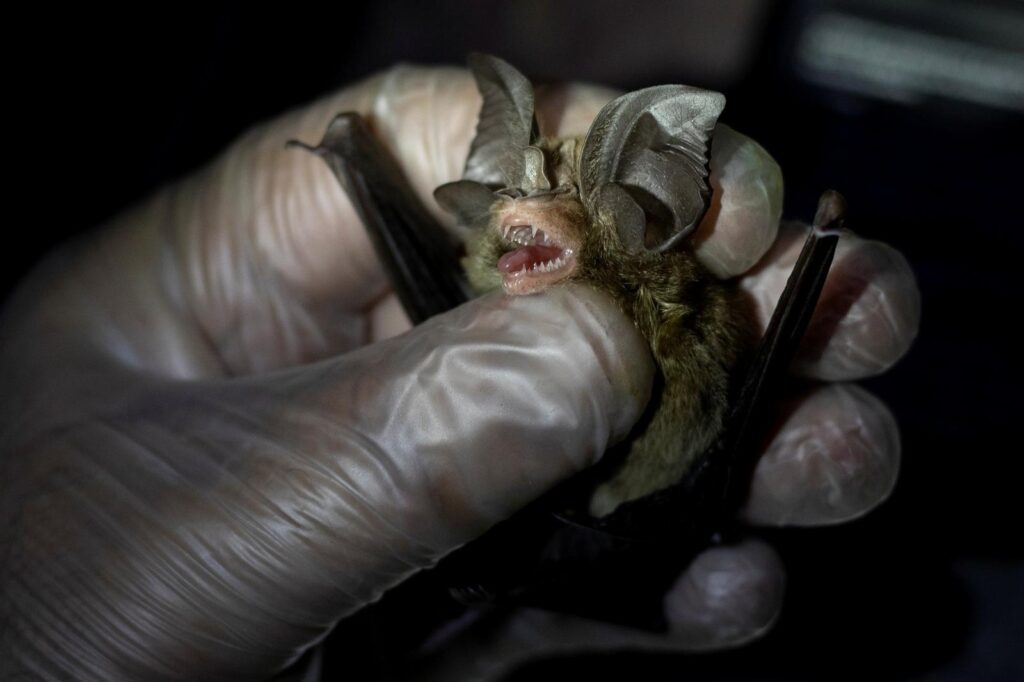By Catching Bats, ‘Virus Hunters’ Hope To Stop Next Pandemic
Mar 23, 2021 | Pratirodh Bureau
A bat ecologist holds a bat that was captured from Mount Makiling in Los Banos, Laguna province, Philippines on March 5, 2021
Researchers wearing headlamps and protective suits race to untangle the claws and wings of bats caught up in a big net after dark in the Philippine province of Laguna.
The tiny animals are carefully placed in cloth bags to be taken away, measured and swabbed, with details logged and saliva and faecal matter collected for analysis before they are returned to the wild.
The researchers call themselves the “virus hunters”, tasked with catching thousands of bats to develop a simulation model they hope will help the world avoid a pandemic similar to COVID-19, which has killed nearly 2.8 million people.
The Japanese-funded model will be developed over the next three years by the University of the Philippines Los Banos, which hopes the bats will help in predicting the dynamics of a coronavirus by analysing factors such as climate, temperature and ease of spread, to humans included.
“What we’re trying to look into are other strains of coronavirus that have the potential to jump to humans,” said ecologist Phillip Alviola, the leader of the group, who has studied bat viruses for more than a decade.
“If we know the virus itself and we know where it came from, we know how to isolate that virus geographically.”
Beyond work in the laboratory, the research requires lengthy field trips, involving traipsing for hours through thick rainforest and precarious night hikes on mountains covered in rocks, tree roots, mud and moss.
The group also targets bat roosts in buildings, setting up mist nets before dusk to catch bats and extract samples by the light of torches.
Each bat is held steady by the head as researchers insert tiny swabs into their mouths and record wingspans with plastic rulers, to try and see which of the more than 1,300 species and 20 families of bats are most susceptible to infections and why.
DEVASTATING IMPACT
Researchers wear protective suits, masks and gloves when in contact with the bats, as a precaution against catching viruses.
“It’s really scary these days,” said Edison Cosico, who is assisting Alviola. “You never know if the bat is already a carrier. What we’re after is finding out if there are any more viruses from bats that can be transmitted to humans. We’ll never know if the next one is just like COVID.”
The bulk of those caught are horseshoe bats known to harbour coronaviruses, including the closest known relative of the novel coronavirus.
Horseshoe bats figure in two of the scenarios of World Health Organization experts investigating the origins of the SARS-CoV-2 virus that causes COVID-19.
Host species, such as bats, usually display no symptoms of the pathogens, although they can be devastating if transmitted to humans or other animals.
Deadly viruses to have originated from bats include Ebola and other coronaviruses, Severe Acute Respiratory Syndrome (SARS), and Middle East Respiratory Syndrome (MERS).
Humans’ exposure and closer interaction with wildlife meant the risk of disease transmission was now higher than ever, said bat ecologist Kirk Taray.
“By having baseline data on the nature and occurrence of the potentially zoonotic virus in bats, we can somehow predict possible outbreaks.”
